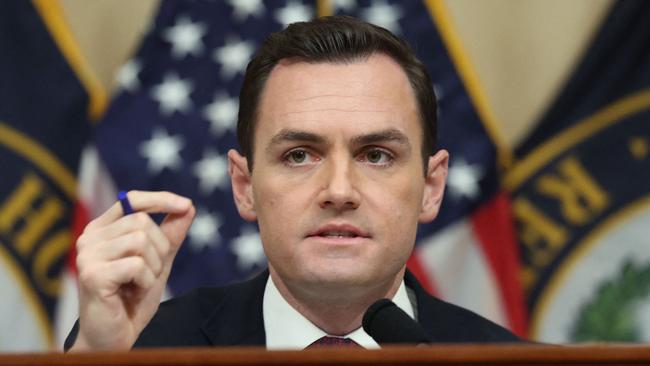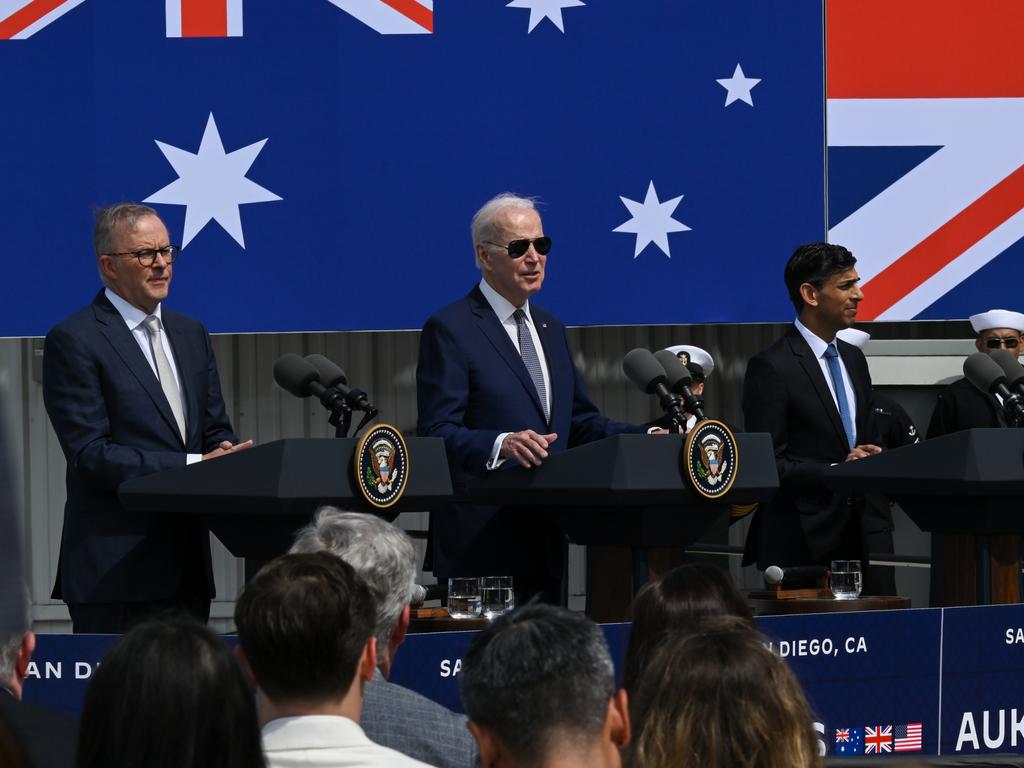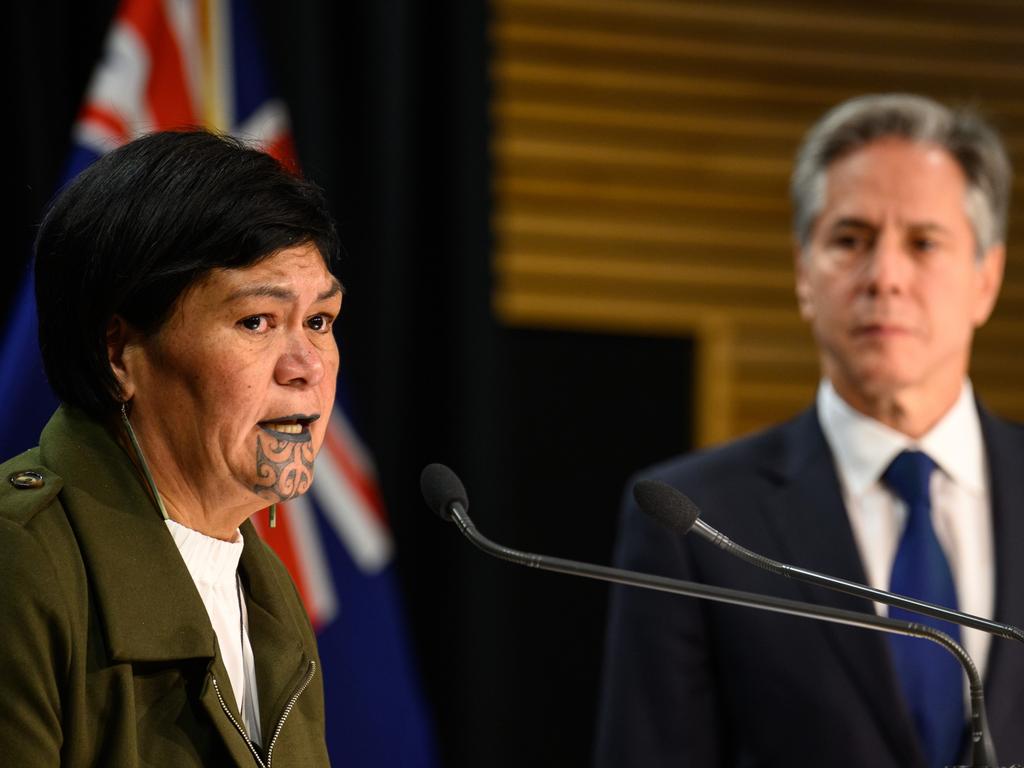US congressman Mike Gallagher: deter war by developing long-range strike capability
Visiting US Republican congressman Mike Gallagher says AUKUS could be used to forward deploy long-range precision missiles in the Indo-Pacific.

Leading US congressman Mike Gallagher has called for Canberra and Washington to turbocharge co-operation under the AUKUS agreement by forward basing long-range precision missiles throughout the Indo-Pacific as a deterrent.
Chair of the powerful US House Select Committee on the Chinese Communist Party, Republican Mike Gallagher, used a speech on Thursday to provide an assurance that congress would approve the transfer of US Virginia-class submarines to Australia, but that billions of extra investment was needed to boost US production.
Mr Gallagher argued the trilateral security agreement between the US, UK and Australia would push the three partner nations into a paradox, declaring that “to prevent war, AUKUS must in a sense adopt a war footing”.
“We must wage peace with the same alacrity, creativity and vigilance with which we have together waged past wars,” he said.
The defence of AUKUS comes ahead of an expected pushback against the agreement by the ALP rank-and-file at next week’s national conference, with 40 local branches having already opposed the deal outright or called for a review.
Delivering the keynote address at a dinner for the Australian American Leadership Dialogue in Canberra, Mr Gallagher said the AUKUS agreement would more fully integrate Australia into the US missile supply chain and that missiles could be forward deployed in the Indo-Pacific region.
“An AUKUS crash program on long-range precision fires, with the associated effort to forward base and operate these fires in concentric rings of fire throughout Indo-Pacom (United States Indo-Pacific Command), could supply our near-term deterrent as we await longer-term deliverables like nuclear attack subs,” he said.
Likening the Chinese Communist Party to a great white shark and the AUKUS agreement to an orca (or a killer whale), Mr Gallagher said that the latter had always emerged victorious.
“The CCP may be a fearsome great white shark, cruising the ocean depths solo, but they fear AUKUS, the strength of which is in our partnerships, in our cunning and in our co-ordination,” Mr Gallagher said.
“With AUKUS, we have the potential to strengthen deterrence, to bring this region from the brink of war.”
While he declared that “America will fulfil its commitment to its friends”, he argued it would need to be accompanied by a massive US expansion in submarine industrial capacity.
“AUKUS will be successful,” Mr Gallagher said. “But it’s going to take billions more in investment by the US — far beyond the Biden administration’s $US2bn request.”
“Nothing in Washington is unanimous, but support for the US-Australia alliance, for AUKUS, and for the submarine deal is as close as it comes,” he said.
“To fulfil our AUKUS commitments, we must expand our submarine industrial capacity. This will take considerable resources.
“Australia’s multibillion-dollar AUKUS contributions to the US submarine industrial base are very much appreciated ... But freedom has never been cheap.
“There is no choice between fulfilling our navy’s requirements and delivering subs for Australia. We can and must do both.”
The reassurance from Mr Gallagher comes after a group of Republicans warned the AUKUS deal to transfer three to five Virginia-class submarines to Australia from the early 2030s would come at the expense of US firepower, and demanded the Biden administration boost production.
Mr Gallagher, a key China critic, acknowledged the war in Ukraine had exposed the “entire democratic world” for “shirking its responsibilities for the better part of 30 years” when it came to defence industrial capacity.
“The result is that the US defence industrial base is severely under resourced and ill-equipped to meet surge production requirements,” he said. “Despite the US Navy’s requirement for 66 attack submarines, we’re at 49, going down potentially to 46 and the latest 30-year shipbuilding plan does not even get us to 60 SSNs until the 2050s.”
Future opportunities would also be provided through AUKUS to co-operate on enhanced capabilities, with Mr Gallagher saying that Australia had a key role to play in supplying the US with munitions because of “shortfalls in our own domestic production”.
“We must prioritise the trilateral co-production of next-generation long-range missiles,” he said.
An agreement was struck following the AUSMIN talks in Brisbane in July to expand the US military industrial base through the production of missiles in Australia for American forces.
It was also accompanied by new plans to strengthen military collaboration in space, step-up the rotations of US forces through Australia, and upgrade Australia’s northern air bases for use by both countries.
Mr Gallagher warned the experience in Ukraine had revealed “how quickly we can go Winchester in modern war”.
“When the Select Committee on the CCP held an unclassified Taiwan war game earlier this spring, the US side exhausted most of its key munitions after only six days,” he said.
“Consequently, as much as Australia is relying on the US for submarine delivery, the US is likewise going to rely on Australia to co-develop and supplement our munitions stockpiles.”








To join the conversation, please log in. Don't have an account? Register
Join the conversation, you are commenting as Logout